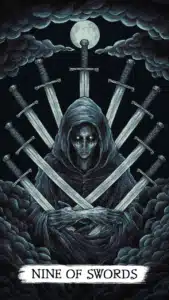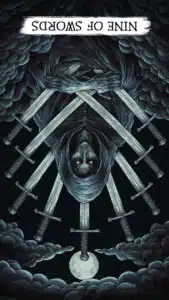Nine of Swords Tarot Card Meaning: Anxiety, Worry, Fear & Guilt
Table of Contents
- Key To Remember
- Nine OF SWORDS
- Introduction
- Overview of the Card
- Description
- The Nine of Swords
- Feature Post: Symbolism and Imagery
- Classic interpretations
- Psychological Perspectives
- Nine of Swords in Tarot
- Reversed Nine of Swords
- Summary Table Nine of Swords Reversed
- Relationships Romance Readings Love (past, present or future)
- Frequently Asked Questions (FAQ)
Key To Remember
• Anxiety and Worry: This is the fretting, nervousness or concern that plagues your mind.
• Guilty and Regret: This card can also talk about feeling guilty and regret for whatever has happened in the past.
• Fear: This emphasizes the fact that these fears are to be addressed through necessary support.
Nine OF SWORDS

Introduction
If any card in the tarot deck brings home to a person with stark clarity that they are not alone as involution approaches its zenith, it is The Nine Swords.
A reminder of the power our minds hold to sow misery or freedom. By sitting in the fears and worries that keep us up at night, this card motivates us to let it go.
Overview of the Card
The Nine of Swords is when your mind will not stop, you can’t sleep and worry brings nothing good. It is a state in which the querent is stepping out of their head, or being ruled by that realm.
It is a reminder from the card itself that most of our fears are just extra stuff — fancier things, success… they are rather overstated and per reports not getting real at all.
Description
The imagery of the Nine of Swords is quite powerful and heart-wrenching. The card typically features someone waking from a nightmare, sitting up in bed with their head resting in their hands.
Nine swords hang on the wall above their head, each one an example of some numbing paranoia that clouds their features.
The isolated and bleak tone of the scene really sets in darkness. The quilt is adorned with symbols of conflict and torment that make it clear the emotional hell this figure lives in.
The Nine of Swords
A long time card for mental anguish. Traditional tarot decks such as the Rider-Waite-Smith display images of this internal war — because that is what insecurity and fear are, a psychological battleground.
Almost always associated with intelligence and strife, the Suit of Swords represents those traits but emphasizes that all pain begins in the mind as opposed to somewhere outside it.
This card has traditionally been interpreted much the same down through the ages because mankind is united in its inner suffering, as we must face our demons and maintain a balance between the light and dark aspects of our character.
Feature Post: Symbolism and Imagery
The Nine of Swords is a card well known for its emotive reaction; the actual image on this particular card tends to draw forth an encumbrance since very often we see it filled with anguish. The image in this card is of a figure lying on the bed with one hand over their face and nine swords hanging from the wall behind them.
It takes place in a dark room layered for the agony and torment they’re experiencing inside. The bed lies with a rose-and-constellation quilt—because in pain, there is still some order to the chaos of nature.
The somber dark tones in both the card and the feeling of loneliness add a strong sense of emotion that suggests these swords are mounted on walls rather than being stuck through an individual, painting them as self-inflicted wounds rather than things created by external dangers.
Swords manifest as a Suit
The corresponding element from the Swords Tarot is Air, which governs mind and intellect. The Swords are the suit more frequently designated for battles, decisions, or dominance — or generally all about your brain.
Particularly in the Nine of Swords, we witness this dark aspect — worry, anxiety, and mental anguish. Our thoughts are one of the greatest tools in building ourselves up; they can also issue themselves against us like an unequal rival.
The Nirvana Number Nine
Numerologically, the nine represents finality—from start to finish or from topmost high down a slippery path. It signifies the end of one cycle and finalization.
In some cases, as with The Nine of Swords, this is not particularly positive. Rather, it symbolizes the peak of this anguish and how crippling these incessant thoughts get. The nine indicates that this person has topped out with all the thinking and worrying they are doing in an effort to push on.
Imagery Analysis
Figure in Bed – The questioner or the subject of the reading. Through despair and loneliness — all of which are rooted in the personal, making it hard to dismiss. Nine Swords: The swords represent what burdens this person.
Each of the swords represents a worry or fear — highlighting how each single thought matters when they stack up over time. Dark Room: The color of the room reflects the darkness of their mind. There is truth in this, as fears surface during the night when there are no more tasks to avoid them.
The roses of love and beauty show their pain to be just one small note in a grand cosmic scheme. The Nine of Swords: A card that represents a mind being crushed by its own power and negative thought processes.
Classic interpretations
The Nine of Swords is nearly always one depicting a figure who appears to be sitting up in bed with their head in hands and surrounded by nine fearsome looking swords.
In the traditional sense, this card speaks to me of mind and heart mid angst. It’s the time where your brain is now in fear land and not good thoughtful thoughts, just making you restless.
General Meanings
The most common meanings of the Nine of Swords: agonizing, mental anguish. More often than not concern is too guilt filled, or regret a nagging bug buzz about you cannot rid yourself of. This might reflect the fact that the querent is haunted by irrational fears.
Nine of Swords (Reversed) Typical no-s: consequences, misuse resentment and madness. This is regarded as the card of pain, mental agony and emotional turmoil. Con: insomnia, sleepless nights. Child has undue anxiety and fear.
Depression as well the impression having to do with hopelessness. Dedicated target about self-blame or at least, self-criticism. This state of affairs can tip the scales in a bad direction pertaining to their mental equilibrium, and the questioner will likely then struggle to calm down.
Those who take away the good:
The Nine of Swords also has a side where they will get some valuable information from their reading. This includes knowing there is a mental stigma; I realize this is the very first thing everyone should know about mental health issues.
Every experience is an opportunity to acknowledge and correct ingrained fears or anxious behaviors. Much of the suffering is forced, but it could also be relieved. Advice to use friends, family or therapists. Being able to have mental stamina can be the difference of life and death, growth or stagnation for any individual.
Although the 9 of Swords can be a tough card, it also functions as an alarm that urges the querent to face their anxieties and take care of themselves for more emotional balance.
Psychological Perspectives
Main Tarot Card
The most powerful card associated with an intense internal struggle is typically depicted on the Nine of Swords. These images evoke the feeling of being unable to sleep because of all your thoughts and worries.
Real inner conflict involves years spent fighting yourself, countless nights of dread and anxiety. It is also a reminder that our internal wars can be just as deadly, and we cannot run from them.
Mood Disorders
Nine of Swords naturally correlates with anxiety and depression. Typically, the card is imagined with a person in the four corners of swords to represent worried thoughts — destructive and pervasive.
Ideas can manifest into helplessness and desolation, which are typical patterns of depression. Four of Disks remind us to remain grounded in the physicality, as we are beings who inhabit this world.
Fear and Guilt
Fear and guilt are core themes connected with the Nine of Swords. It embodies a tortured soul — held hostage by fears and haunted by transgressions from the past. Fear can paralyze, and guilt can be overwhelming. The Nine of Swords asks how we feel when something catastrophic happens and encourages us to confront those feelings in order to identify their origins and seek forgiveness.
Nine of Swords in Tarot
In tarot, the Nine of Swords is a card that may indicate some kind of acute mental anguish, anxiety, and ordeal. Yet, there are other spiritual and philosophical dimensions to that card.
Dark Night of The Soul:
The Nine of Swords might represent this turbulent time in your life. Symptoms include:
- One of our most emotionally and mentally trying moments
- Feeling unaccompanied, alone
It is an essential aspect we must suffer on the path to spiritual enlightenment, however painful it may be. If you happen to meet this particular person, he or she will remind you of the worst side that you have ever been in; one hell of a spiritually empowering and heart-crushing journey.
Karmic Lessons
The Nine of Swords can also indicate that karmic life lessons must be learned. The experience of pain is typically a retribution for karma, and the lessons learned are profound and rooted in past actions or decisions.
Things to Think about Beforehand:
- Assessment of what we have done before and how they turned out;
- Our moral conducts also matter in this life.
Forgiveness of Self and Others— When you embrace these karmic lessons, it creates a foundation to live more peacefully in the present moment with your past behind you.
Spiritual Growth: As dark as the Nine of Swords can be, it suggests a solid opportunity for spiritual expansion. This card challenges you to:
- Create strength in yourself
- Spend your time seeking knowledge, meditating & introspecting
- Embrace compassion and empathy for self or others
By beginning practices such as these, the pain and suffering associated with this nine can be transformed into a catalyst that propels further spiritual growth and realization.
Reversed Nine of Swords

When the nine of swords comes up reversed, you can think about it as a little release from all we knew to be darkness and terror.
This card speaks to the darkest of emotions; particularly in reversal, you have reached rock bottom and can only climb back out from a place better than absolute despair or fear for at least there is an ultra-bright light shining through.
Overcoming Fears
With the Nine of Swords in reverse, this is a significant sign to show that you are at a crucial turning point and learning how to ascend above your personal fears and anxieties.
This is what it looks like to finally work through the mind game and start to mend.
It may be that the person would benefit from therapy, such as being held by friends and loved ones to meet their inner demons. This slow evolution will help ease a bit of the distress that wears down on you.
Transformation for the Good
Upright: positive change. Reverse: every transformation has its growing pains. And remember! Sometimes it is a period of healing and growth. It means that perhaps the one who is inquiring was stronger than ever and has learned from past sorrows just by calling it grief.
Reversed Nine of Swords can be the change to start looking more optimistically at a situation, by starting to prioritize caring for oneself and growing in some positivity. In all of this, the querent must be able to fight through battles; they will emerge victoriously.
Summary Table Nine of Swords Reversed
The curse has been lifted from your life! Turn away from the shadows and keep moving ON. This is all about a life changing revival and how it brings certain changes in our lives.
| Aspect | Upright Nine of Swords | Reversed Nine of Swords |
|---|---|---|
| Emotional State | Overwhelming Anxiety | Relief from Anxiety |
| Mental Health | Nightmares and Despair | Overcoming Fears |
| Outlook | Hopelessness | Positive Transformation |
Relationships Romance Readings Love (past, present or future)
In a relationship reading, The Nine of Swords can be an indication that there are fears very deeply rooted within the individual. It could also represent someone who has gone through heartache and may struggle to open up again.
Part of one or both partners are starting to doubt the whole thing, lying there awake at night wondering what the future will look like. This card is asking them to communicate the issues they have with each other openly and honestly.
It could also mean that there are traumas from the past coming up in the relationship. If this tarot card comes up as an answer to a question, it does tell the person to be kind and considerate with themselves and their partner.
Career and Life Path
When it comes to career or life path readings, the Nine of Swords can symbolize a period where you may be going through professional pressures or uncertainty. Usually, the querent will feel overwhelmed by their obligations or worried about losing their job.
This card is a reminder to actively manage stress by seeking help from colleagues or writing daily to-do lists with prioritized tasks. It may also mean the querent is working a job or traveling down their life path that does not fit where they really should be.
The spirit of introspection and future planning is likely to minimize the anxiety that revolves around career-related fears.
Frequently Asked Questions (FAQ)
What is the overall mood depicted in the Nine of Swords card?
The overall mood of the Nine of Swords card is one of anguish, stress, and anxiety. The card typically depicts a person sitting up in bed at night with their hands covering their face, suggesting sleeplessness due to overwhelming worries and fears.
How does the symbolism of the swords in the card contribute to its meaning?
The nine swords hanging on the wall symbolize mental burdens and thoughts that cause fear and distress. In tarot, swords generally represent the mind and intellect, so their presence emphasizes mental anguish and internal struggles.
Who was the artist behind the Rider–Waite version of the Nine of Swords?
Pamela Colman Smith was the artist who illustrated the Rider–Waite version of the tarot deck, including the Nine of Swords card. She worked under the direction of Arthur Edward Waite.
What does the background imagery in the Nine of Swords card signify?
The dark room and night setting in the background highlight themes of insomnia, nightmares, and unrelenting worries. It suggests a period where one’s fears feel more intense during solitary nighttime hours.
How can understanding the Nine of Swords help people struggling with anxiety?
Understanding the Nine of Swords can help people recognize that their fears and anxieties are part of a broader human experience. Acknowledging these feelings can be a first step toward addressing them through professional support or personal reflection.
In what way is the concept of 'self-sabotage' related to the Nine of Swords?
The concept of self-sabotage is related to the Nine of Swords in that the card often represents fears and anxieties that stem from one’s own mind. These negative thought patterns can hinder progress and contribute to one’s suffering.
Can the imagery of the Nine of Swords indicate potential for overcoming obstacles?
Yes, although the Nine of Swords primarily reflects distress, it also suggests that recognizing and confronting these deep-seated fears is essential for personal growth. This awareness can be transformative, leading to eventual recovery and resilience.
What historical context surrounds the creation of the Nine of Swords depiction in tarot decks?
The Nine of Swords, as seen in modern tarot decks like Rider–Waite, was influenced by earlier European tarot traditions dating back to medieval times. A notable historical reference is the Charles VI tarot deck, which contributed to tarot’s evolution as a divination tool.
How does Eden Gray interpret the Nine of Swords in her writings?
Eden Gray interprets the Nine of Swords as a representation of inner turmoil and mental suffering. In her works, she often emphasizes this card as indicative of a ‘dark night of the soul’ where an individual confronts their deepest fears.
What advice does Sarah Potter give for handling the energy of the Nine of Swords?
Sarah Potter advises that when dealing with the energy of the Nine of Swords, it’s important to seek out supportive relationships and professional help if needed. She emphasizes practicing mindfulness and self-care to manage stressors effectively.

